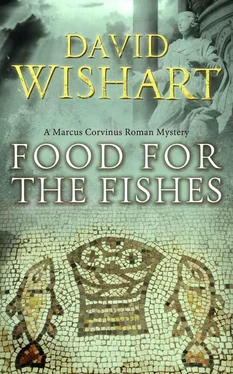David Wishart - Food for the Fishes
Здесь есть возможность читать онлайн «David Wishart - Food for the Fishes» весь текст электронной книги совершенно бесплатно (целиком полную версию без сокращений). В некоторых случаях можно слушать аудио, скачать через торрент в формате fb2 и присутствует краткое содержание. Год выпуска: 2015, Жанр: Исторический детектив, на английском языке. Описание произведения, (предисловие) а так же отзывы посетителей доступны на портале библиотеки ЛибКат.
- Название:Food for the Fishes
- Автор:
- Жанр:
- Год:2015
- ISBN:нет данных
- Рейтинг книги:4 / 5. Голосов: 1
-
Избранное:Добавить в избранное
- Отзывы:
-
Ваша оценка:
- 80
- 1
- 2
- 3
- 4
- 5
Food for the Fishes: краткое содержание, описание и аннотация
Предлагаем к чтению аннотацию, описание, краткое содержание или предисловие (зависит от того, что написал сам автор книги «Food for the Fishes»). Если вы не нашли необходимую информацию о книге — напишите в комментариях, мы постараемся отыскать её.
Food for the Fishes — читать онлайн бесплатно полную книгу (весь текст) целиком
Ниже представлен текст книги, разбитый по страницам. Система сохранения места последней прочитанной страницы, позволяет с удобством читать онлайн бесплатно книгу «Food for the Fishes», без необходимости каждый раз заново искать на чём Вы остановились. Поставьте закладку, и сможете в любой момент перейти на страницу, на которой закончили чтение.
Интервал:
Закладка:
If, on the other hand, the partnership had preceded the marriage then there were problems there too: it raised the question of why, if Murena was already making all the running financially and otherwise, he’d given Tattius his daughter at all. Oh, sure, again it’s an old Roman custom to cement a business alliance with a wedding, but Tattius and Penelope weren’t an obvious couple. They were thirty years apart in age, for a start; also, like I say, friendship and business are two different things, a marriage alliance, in families like Murena’s, is definitely part of the business side, and if Tattius didn’t have all that much going for him in himself then partnership or not someone like Murena would’ve thought twice about signing his only daughter away in a marriage contract. Or should’ve, rather, because he obviously hadn’t.
Plus that scenario still left us with the original problem of why the partnership in the first case…
Shit; I was going round in circles here, and my brain was beginning to overheat. Leave it. There was an answer somewhere, sure, but at present finding it was in the flying pigs category.
The same applied to the question of Tattius’s nickname. I’d met Tattius now and it still didn’t make sense. Whatever the guy was, he was no gadfly: I’d reckon he had about as much get-up-and-go as a flatfish. Not that he was soft; he just didn’t show any signs of stirring himself, let alone spurring anyone else on. Oh, he was pushing it now and boyhood nicknames don’t have much relevance at that age, but it was still odd. Why ‘Gadfly’? You’d think there ought to be some signs there, but there weren’t.
What else? Just his general manner. By Tattius’s own admission the two had known each other practically since they were kids, both as friends and business partners. Yet when he’d talked about Murena he could’ve been talking about a comparative stranger. Certainly there’d been no real grief. He hardly even seemed to care all that much that the guy was dead. Again, it was nothing definite, and if he had it would’ve left him in a minority of one, but somehow it just didn’t fit.
Last, there was the business of the wife. Murena’s first one, the one who died…
That’d been screwy, because it was unexpected. Yet I couldn’t be wrong: there had been a…reticence there: Tattius had been reluctant to talk about her. And why the hell should he be? After all, like he’d said, the woman had been dead for thirty years. So why —?
Bugger. Questions, sure; after that talk with Tattius I had them in spades. As far as answers were concerned, though, everything added up to one big zilch.
Puzzling was putting it mildly.
To get to the villa where we were staying, I had to go through the town centre. Baiae isn’t as crowded as Rome, sure, nowhere near it, but by mid-morning — which it was now — there were a fair number of people around. Not the gilded-wonder set, mind. That time of day, in Baiae, most of them are still sleeping off the night before or being variously prinked, painted and clipped for the strenuous evening ahead. Plus the fact that too-direct sunlight and fresh air are so bad for the complexion, and what’s the point in going out when there’s no one to see you, darling? There were just the ordinary working punters, the sort you’d see in any small town: old biddies with string bags full of vegetables, slaves doing the household shopping and guys driving laden donkeys and/or carrying an assortment of hardware or chickens on poles. Real people, in other words.
Under these circumstances, riding’s not a good idea, not when the streets are narrow, the poles are at groin height and most of the guys who are carrying them are selectively blind to pushy buggers on horseback. I dismounted and led the mare by the bridle.
I was passing through the market square — nice marble statues of Augustus and old Julius, if you’re interested, which I wasn’t — when I thought of Priscus’s gambling hall. He hadn’t told me exactly where it was, of course, but these places aren’t common, even in Baiae, and I knew the rough direction. I might as well check it out — and check out its owner Philippus — while I was in the area. That was one guy I really wanted to talk to.
I left the mare at a handy water-trough outside the baths and headed down the most likely-looking side street. This close to the centre, most of the buildings have shops of various kinds on their ground floors while the owners live above. Or, of course, use the whole place for business: the girls on two out of three of the balconies I passed obviously weren’t there to hang up the family washing, and like I say in that part of town the entrepreneurial ethos is alive, well and ready to give anyone a good time at any hour.
I stopped by a vegetable-seller’s, waited politely until the old biddy in front of me had bought her leeks and had a long conversation with the shopkeeper about her martyrdom to Feet, and asked for Philippus’s place.
‘It’s over by the baths,’ the vegetable-seller said. ‘You can’t miss it.’
‘You mean the baths by the square?’
‘Nah. The ones in that direction.’ She pointed.
If Baiae has a lot of anything for its size, it’s baths. The locals might cater for the worst excesses Rome’s gilded holidaymakers can ask of them, but at least they do it clean. ‘Got you,’ I said. ‘Thanks, Grandma.’
I hadn’t gone far wrong: another street down, one to the left, then back up a hundred yards or so the way I’d come. I found the place no bother, largely because of the door-slave out front: a huge German with braided hair and moustache and a gut on him so big that pedestrians were having to take a detour to get round it. It wasn’t all beer and sausage, mind: the guy was seriously muscled, and he had a mean look in his eye. Evidently Philippus didn’t take any nonsense from unwanted customers. I’d reckon that if Big Hermann here bounced you you’d stay bounced for a month.
I checked with him that it actually was Philippus’s, getting a slow stare and a final supercilious nod in answer, and went in.
The place was impressive. Like I say, gambling in public’s technically illegal most of the time, and although as long as the owner pays his taxes and adds a generous sweetener there isn’t much chance of the local authorities closing him down that doesn’t mean he can be too obvious about things. Most gambling dens are pretty basic, no more than a back room in a wineshop with two or three tables set aside for bones or dice, or if they cater for the more sophisticated punter a couple of Twelve Lines or Robbers boards that the landlord keeps behind the bar until they’re asked for. Definitely, in other words, a low-key business, and one where — if need be, and the law comes knocking — the owner can hide the evidence of his nefarious practices pretty smartly.
How Philippus had swung it I didn’t know, but we were in a totally different league here. Forget the wineshop back room: barring the furnishings and fittings, the place could’ve been a top-of-the-range private house or a high-class brothel, with frescoed walls and inlaid marble flooring. The central atrium was twice the size of mine at home, easy, and the pool had a Venus-and-her-nymphs fountain that could’ve graced a Janiculan villa. That wasn’t all, either. A staircase in polished cedar led up to a mezzanine level under a dome painted with assorted watching gods and goddesses, and at the far end of the room a set of pillars gave out onto a porticoed garden, while two or three side doors showed that there was a lot more that I hadn’t seen yet.
The place wasn’t crowded — it wouldn’t be, this early in the day — but it wasn’t empty, either. Atriums are usually pretty sparsely furnished, as a rule, but besides a fair sprinkling of statues and bronze candelabra this one had at least a dozen tables, each with its full complement of chairs or couches. About half of them were occupied, and there was a sort of busy hum that you get when you’re somewhere that people are taking what they’re doing seriously. No one looked up.
Читать дальшеИнтервал:
Закладка:
Похожие книги на «Food for the Fishes»
Представляем Вашему вниманию похожие книги на «Food for the Fishes» списком для выбора. Мы отобрали схожую по названию и смыслу литературу в надежде предоставить читателям больше вариантов отыскать новые, интересные, ещё непрочитанные произведения.
Обсуждение, отзывы о книге «Food for the Fishes» и просто собственные мнения читателей. Оставьте ваши комментарии, напишите, что Вы думаете о произведении, его смысле или главных героях. Укажите что конкретно понравилось, а что нет, и почему Вы так считаете.












